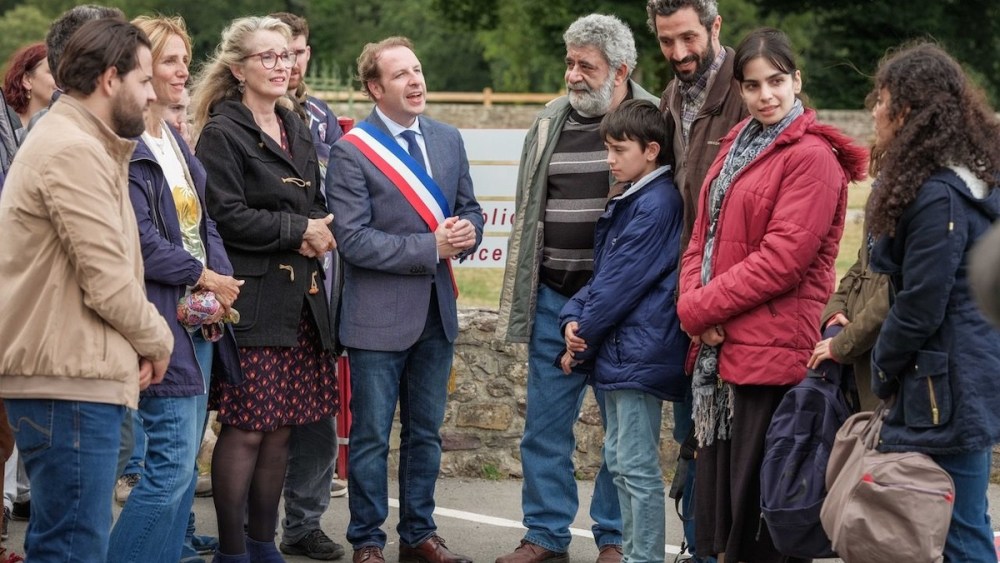In the culture clash comedy ‘Meet the Barbarians’, actor-director Julie Delpy exposes a number of Western hypocrisies. The film follows several townspeople in the struggling French commune of Paimpont, who vote to welcome a handful of Ukrainian refugees, but are surprised when a Syrian family shows up instead. The ensuing reactions range from awkward to hostile, which Delpy captures by applying a documentary-style lens to the fabric of the city and their Arab guests. The result is a film that, while never quite reaching the dramatic heights it aims for, proves to be eye-wateringly funny.
The film flies out of the gate with an energy reminiscent of “The Office,” as bumbling mayor Sébastien Lejeune (Jean-Charles Clichet) regales a TV news crew with his plans to welcome a Ukrainian family. The municipal council votes in favor by a large majority. Even would-be robber Hervé Riou (Laurent Lafitte), the sour-faced city plumber, gives in after a little push from his colleagues. A number of local interviews discuss the issue of the Russian invasion, and of welcoming the Ukrainians with open arms, which was generally agreed upon, despite the fears and economic concerns that people like Hervé might harbor. However, these doubts resurface when the city learns of the administrative switcheroo.
The segments of ‘Meet the Barbarians’, shot by TV cameras, are distinguished from the rest of the film by news chyrons, but also by a smaller frame. But even the non-mockumentary narrative segments take a similar visual approach, reminiscent of Michael Winterbottom’s series “The Trip,” in which the film’s subjects still perform to some extent even when not being interviewed. Lejeune, for example, is deeply concerned about the optics of accepting refugees and wants to guarantee the most hospitable atmosphere, if only to maintain political cachet. When he finds out that Ukrainians are being welcomed en masse across Europe, he seems disappointed that Paimpont does not want to provide its own members with this valuable commodity. Deply’s character, the progressive teacher Joëlle, helps organize the arrival of the refugees, but is also prone to clumsy expressions of outward acceptance.
The aforementioned Syrian family, the Fayads, are presented for the most part unremarkably, although this is part of Deply’s point. Architect father Marwan (Ziad Bakri), his graphic designer wife Louna (Dalia Naous), her grumpy father Hassan (Farès Helou), their school-aged children Dina (Ninar) and Waël (Adam), and their doctor aunt Alma (Rita Hayek ). ) are simply too exhausted from their time in refugee camps (where they learned French) to worry about what every Paimpont resident thinks of them. However, they do their best to put down roots and become part of the community, which means doing odd jobs here and there because their diplomas are not valid in France, or have literally been destroyed along with their house in Damascus.
Although we are given hints about the Fayads’ inner lives and desires, in ‘Meet the Barbarians’ they are unfortunately deployed in the same way as the city’s politicians, primarily as a political entity to make a broader argument can feed. That argument, however, is strong and introspective, revealing two primary factions that define much of the Western discourse around the topic of refugees. There are people like Joëlle and her perpetually drunk best friend Anne (Sandrine Kiberlain), whose well-intentioned liberal politics are still laced with orientalism. And then there are people like Hervé and Anne’s Philippe (Mathieu Demy, the supermarket owner), whose approach to all things Muslim and Arab is much more suspicious and hostile.
In what is perhaps the film’s greatest strength, Delpy presents these apparent contradictions as two sides of the same coin, whose respective approaches spring from the same source of prejudice and misunderstanding, even if they manifest differently. More serious contemporary films have touched on the poignant aspects of the refugee experience, such as Ken Loach’s ‘The Old Oak’ and Agnieszka Holland’s ‘Green Border’ (the latter even hinting at the same double standard Delpy targets, in which white refugees are welcomed more easily than their Middle Eastern counterparts), but as a comedy, “Meet the Barbarians” can afford to be more detailed in its approach.
Although the Fayads face hardships—including a greater barrier to empathy, as they usually have to prove their traumas in some way—thankfully, their story is no longer one of life and death. This allows the film to delve into the details and tedious red tape of their experiences, as well as the small tensions that arise when a perceived obscurity is thrust into a small-town spotlight. It’s a bright, sunny and impeccably entertaining story, despite its dark corners. However, Delpy never loses sight of the bigger picture, offering constant clues that the world remains harsh on Muslim refugees, even beyond this one hilarious story.





















